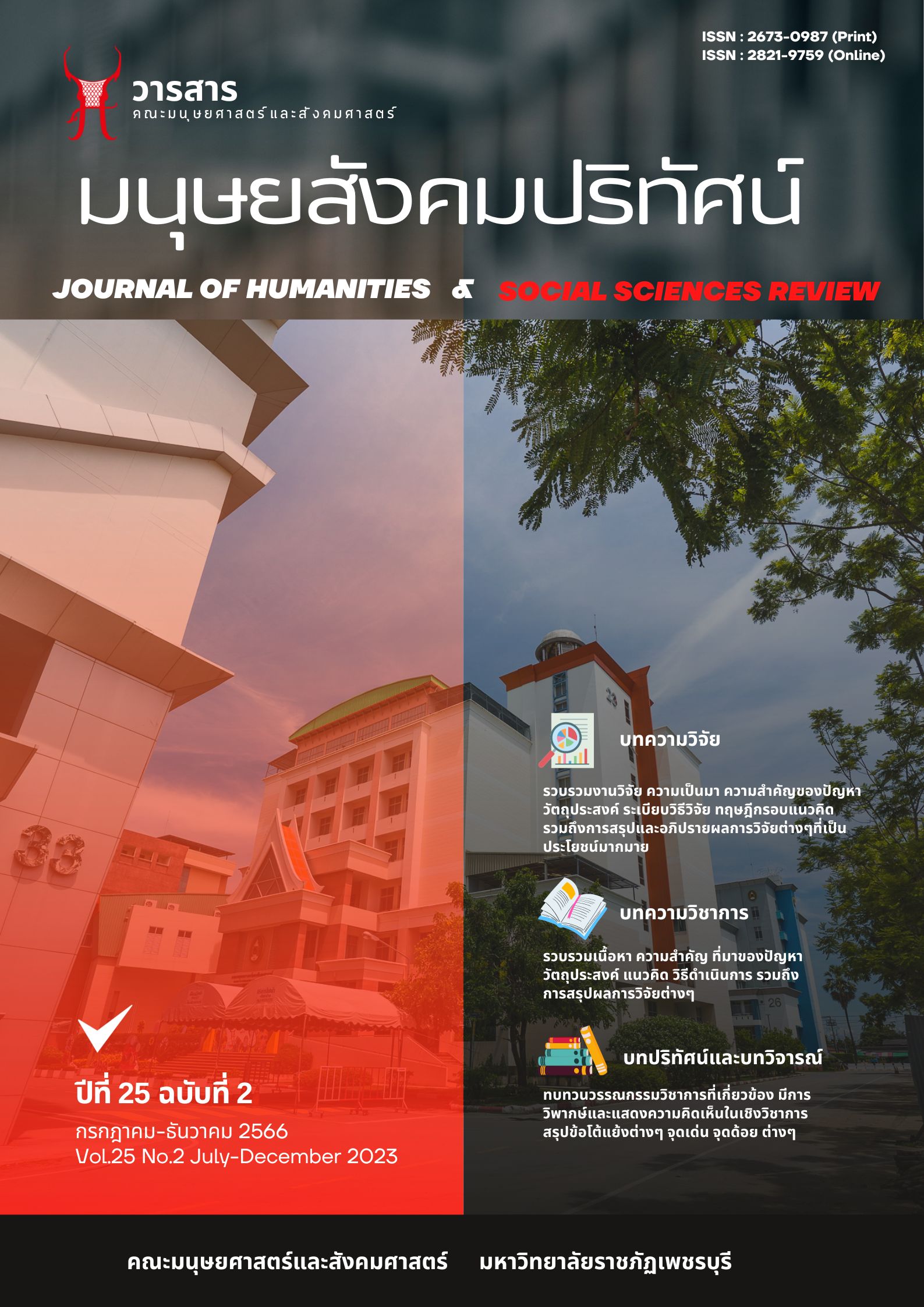The Development of Education on Sufficiency Economy and Upgrading General Education Subject on the King's Philosophy of Rajabhat University to the 21st Century: Grassroots Economy Recovery, Supporting for Climate Change, Laying the Foundation of Entrepren
Main Article Content
Abstract
The objectives of this study were to 1) investigate the best way to develop and promote knowledge and understanding of the principles of the sufficiency economy philosophy; 2) study the ways to enhance the general education subject of “King’s Philosophy” into a skillset for learning in the 21st century; and 3) study the ways to promote the learning resources based on the King’s Philosophy for sustainable economic development at the local grass-roots level and to drive innovation communities to become self-reliant entrepreneurs who can help society. The target groups included 10 educational administrators, 30 students registered in the King's Philosophy course, and 15 individuals related to learning resources based on the King’s Philosophy. The research tools used included structured questionnaires, interviews, and data synthesis. The research results found that: 1) developing and promoting knowledge and understanding of the application of the principles of the King’s Philosophy and Sufficiency Economy Philosophy has created knowledge and enabled people to apply it in their daily lives through learning management in both traditional and online classrooms, as well as accessing learning resources outside of the classroom. This has allowed learners to develop their knowledge, skills, and attitudes. 2) The strategy for improving the subject of “The King’s Philosophy” at Phetchaburi Rajabhat University started with adjusting education management policies to ensure that every student learned about the King's Philosophy and the subject was promoted to the public more extensively by creating learning networks and focusing on integrated learning management with local communities and learning resources in the King’s Philosophy. As a result, “The King’s Philosophy” will be elevated to a higher level. 3) The strategy for promoting and driving the learning of the King’s Philosophy in the local community includes driving university policies, networks, academic service projects, student teacher-training programs, social engineer programs, community prototypes, and technology and innovation.
Article Details
1. Any views and comments in the article are the authors’ views. The editorial board has not to agree with those views and it is not considered as the editorial board’s responsibility. In case, there is any lawsuit about copyright infringement, it is considered as the authors’ sole responsibility.
2. The article copyright belonging to Faculty of Humanities and Social Sciences, Phetchaburi Rajabhat University are copyrighted legally. Republication must be received direct permission from the authors and Phetchaburi Rajabhat University in written form.
References
กระทรวงศึกษาธิการ. (2551). หลักสูตรแกนกลางการศึกษาขั้นพื้นฐาน พุทธศักราช 2551. กรุงเทพฯ: โรงพิมพ์คุรุสภาลาดพร้าว.
จิดาภา สุวรรณ. (2558). ผลการปรึกษากลุ่มโดยการกำกับตนเองต่อพฤติกรรมการใช้จ่ายเกินความจำเป็นของนิสิตปริญญาตรี. วิทยานิพนธ์ปริญญาวิทยาศาสตรมหาบัณฑิต สาขาวิชาจิตวิทยาการปรึกษามหาวิทยาลัยบูรพา.
พระราชบัญญัติมหาวิทยาลัยราชภัฏ พ.ศ. 2547. (2547). ราชกิจจานุเบกษา เล่มที่ 121 ตอนที่ 1.
พรสันต์ เลิศวิทยาวิวัฒน์. (2550). รูปแบบการพัฒนาคุณลักษณะนิสัยที่พึงประสงค์ของนักเรียนอาชีวศึกษาเอกชน. ชลบุรี: มหาวิทยาลัยบูรพา DOI : https://doi.nrct.go.th/ListDoi/listDetail?Resolve_DOI=10.14457/BUU.res.2007.2
ไพฑูรย์ สินลารัตน์. (2554). กรรมการสภามหาวิทยาลัย : ภารกิจใหม่กับอุดมศึกษาไทย. กรุงเทพฯ:โรงพิมพ์มหาวิทยาลัยธุรกิจบัณฑิตย์.
ภูสิทธ์ ภูคำชะโนด. (2564). แนวคิดของวิศวกรสังคม. สืบค้นเมื่อ 1 มีนาคม 2565, จาก https://rk.mcu.ac.th/rbAcademic/.
มหาวิทยาลัยราชภัฏเพชรบุรี. (2564). ยุทธศาสตร์มหาวิทยาลัยราชภัฏเพชรบุรี ระยะ 5 ปี 2560-2564. เพชรบุรี: มหาวิทยาลัยราชภัฏเพชรบุรี.
แมนพาวเวอร์กรุ๊ป. (2564). เผยแนวโน้มตลาดแรงงานปี 2564 พร้อมแนะนำนายจ้าง-ลูกจ้างปรับตัวรับมือทุกการเปลี่ยนแปลง. กรุงเทพฯ : บริษัท แมนพาวเวอร์กรุ๊ป.
มูลนิธิปิดทองหลังพระ. (2564). รายงานประจำปี 2563 มูลนิธิผู้ปิดทองหลังพระ สืบสานแนวพระราชดำริ. กรุงเทพฯ: มูลนิธิปิดทองหลังพระและสถานบันส่งเสริมและพัฒนากิจกรรมปิดทองหลังพระ สืบสานแนวพระราชดำริ.
วิจารณ์ พานิช. (2555). วิถีสร้างการเรียนรู้เพื่อศิษย์ในศตวรรษที่ 21. กรุงเทพฯ: มูลนิธิสดศรี สฤษดิ์วงศ์.
วิชัย ตันศิริ. (2543). การปฏิรูปการเมืองไทย มุมมองของการศึกษาเปรียบเทียบ. กรุงเทพฯ: จุฬาลงกรณ์มหาวิทยาลัย.
วิชัย วงษ์ใหญ่. (2554). นวัตกรรมหลักสูตรและการเรียนรู้สู่ความเป็นพลเมืองดี. กรุงเทพฯ: อาร์แอนด์ปริ๊นต์.
สำนักงานคณะกรรมการพัฒนาการเศรษฐกิจและสังคมแห่งชาติ. (2550). ปรัชญาของเศรษฐกิจพอเพียงกับสังคมไทย. กรุงเทพฯ : เพชรรุ่งการพิมพ์.
สำนักงานคณะกรรมการพัฒนาการเศรษฐกิจและสังคมแห่งชาติ. (2564).แผนพัฒนาเศรษฐกิจและสังคมแห่งชาติฉบับที่สิบสอง พ.ศ. 2560-2564. กรุงเทพฯ : สำนักงานคณะกรรมการพัฒนาการเศรษฐกิจและสังคมแห่งชาติสำนักนายกรัฐมนตรี.
อนันต์ อนันตกูล. (2521). การปกครองท้องถิ่นไทย (พิมพ์ครั้งที่ 3). กรุงเทพฯ: โรงพิมพ์พิฆเณศ พริ้นติ้งเซ็นเตอร์.


